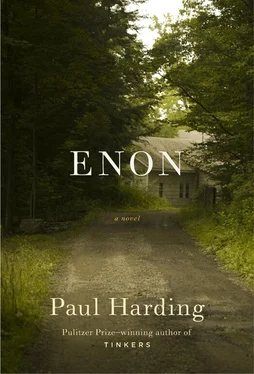The music accompanying the spectacle is stilted and fractured. It lurches from wheezy calliopes to pennywhistles to ground-shaking brass to sour, scraping strings to air-raid sirens. At one point, I catch an oompah pattern sounding on an accordion deep inside the din. I tap the triplets on my thigh with my ring, middle, then forefinger, grateful for something recognizable, almost reassuring. I begin to sway my head back and forth in whole notes behind the rhythm. When I look back at Kate, she is raising and lowering her right arm and her right leg and tilting her head to the right, along with the beat I’m playing. I frown and stop tapping my fingers and Kate’s arm and leg and head stop, too. I tap my right ring finger once. Kate’s leg raises and lowers. I tap my middle finger once and Kate’s arm raises and lowers. I tap my forefinger and Kate’s head nods. I repeat the pattern with the fingers of my left hand and Kate’s left limbs rise and fall and her head tilts left. I look up into the darkness above her and see that the brass drum and the metal comb are not the mechanisms that control Kate behind the curtains but props, meant to be seen, meant to be seen within the play on the stage. I tap my fingers in a little march and Kate jerks along with it.
I gasp when I realize what is happening and a wall of flames bursts behind Kate and her grotesque costume ignites. She is enshrined in fire and the entire production gives way. All the staging and framing and cables and gears and winches collapse in an instant, with Kate disappearing underneath it all, and the wreckage is yanked back behind the hill without a sound and without a trace. The last I see of Kate is her pale face before it is gulped into the fire and collapsing rubble. The whole spectacle has the appearance of being staged to look like a disaster, as if the beautiful girl perishes in a catastrophe, but that, of course, is always a part of the trick. I cry out for her.
That’s right; chuck your girl into the furnace, palooka!
Huzzah!
Hip, hip, hooray!
He burns her at the stake every single night!
And look at him crying over her — what a baby!
Boo hoo hoo!
Just wait until we get ahold of you!
A HURRICANE STRUCK THE EAST COAST AND SWEPT THROUGH Enon in early August, right before the anniversary of Kate’s death. I would not have known that it was coming if I hadn’t walked to Stonepoint to try to find Frankie Shuey at the Ironsides Tap Room, so I could buy more drugs. When I arrived at the bar, Frankie and another guy were the only ones there. The guy sitting next to Frankie looked vaguely familiar, as if maybe I’d seen him on other landscaping or painting crews over the years. He was thin and his shoulders so slouched it looked like he might snap in two. His complexion was pale gray and the sharp bones in his face looked like they might split through the skin. He had thin black hair and a black mustache up under which a burning cigarette had been stuck. I could tell by how sunken his cheeks were that he had no or very few teeth left. Overall, he had the appearance of a body long abused but not especially strong in the first place. I had a sense that he was always sick, always had a cough, always had asthma or bronchitis, always needed bed rest and hot soup and a good drying out. He and Frankie sat side by side, each with a boilermaker. The already dim bar darkened more and I looked over at the two high, wide, narrow, smoked windows in the wall that faced the harbor. One window was already blacked out and I watched as someone outside fitted a sheet of plywood over the other and began pounding it into place with a hammer and nails. The guy Frankie was drinking with sat on his left, so I pulled out the bar stool to his right.
I said, “Hey, Frankie.” Frankie turned to see who I was and turned back to the bar.
“Hey,” he said. The guy on the other side of him looked at me and crunched up his nose.
“The fuck’s this guy?” he asked Frankie.
“It’s Charlie Crosby,” Frankie said.
“Who the fuck?”
“He’s a guy named Crosby,” Frankie said.
“ ’Scuse me ,” the guy said. “He smells like shit. Tell him to get out of here. Hey, you, Charlie Crosby; you look and you smell like shit — get lost.” I remembered stories about how sometimes the guys on the fishing boats that worked out of Stonepoint would stage fights on a pier or in an alley behind a bar at night. They’d make some crew member fight the toughest guy in the fleet, and threaten to beat him half dead if he didn’t. They’d get him drunk and riled up and show him a little wiry guy they said was talking shit about him and say that if he didn’t beat the guy up they’d beat him up for being a punk. They’d always snare a new guy into this trap, the bigger the better, because he’d always think that he could take the little guy they pointed out. I remembered stories guys to whom this had happened told about how all the other fishermen made a circle and got the little guy and the dupe in the middle and started taking bets about how long it’d take the little guy to put the big new guy into a coma. Every version of the story I’d heard was about how unbelievable it was what a ruthless and tough fighter the little guy had been and how the guy he’d beaten had woken up in his own apartment three days later packed in ice, so battered that he couldn’t see or eat or nearly move just to get a sip of water for a week. In all my time working on painting and landscaping crews, I’d never been in a fight and never seen one as bad as the ones they described (sometimes guys took a slap at each other, but nothing really brutal). I could see the guy sitting next to Frankie being sick and drunk and high and underfed and never getting any sleep and hauling fish or lobster traps up into a boat in a T-shirt with bare hands in roasting sun and drenching rain and freezing snow, every day that the seas weren’t too high, for twelve, fourteen hours a day, looking every second as if what he was supposed to do was die, as if it was his real job to die, young and viciously, whether through ignorance or orneriness or hatred born of destroying himself in revenge against whatever it was that brought him into this world from his mother’s womb just so that it could watch him suffer his dad’s fists and his friends’ fists and after die back out of it, ground down and broken.
I didn’t know whether the guy with Frankie was tough like that or one of the guys who weren’t strong, weren’t tough, but were the wretched of the wretched and for that reason left alone by the brawlers, or not left alone but let be by them, allowed to be a kind of mascot. He made me feel sick and frightened but also guilty. Part of me felt like I’d like to grind him right up and out of this world, like a roach, because he was so bereft of anything like human kindness or intelligence or light. But for the same reason part of me felt defensive of him against that very same sentiment of disgust and contempt.
I stepped back from the stool I was about to sit on.
“Hey, hey; okay; I don’t need to stay. I just want to ask Frankie something,” I said.
“ Oh , well, fuck you ,” the guy said, in a high voice, like he was trying to imitate a little girl.
Frankie snorted out a laugh and looked at the guy for a second and looked again at the bottles lining the back of the bar and shook his head. “Jesus, Scruff,” he said. “You’re a white-hot little leprechaun today. It’s business, man.”
“I bet it’s business,” Scruff said. He looked at me from my shoes to my hair. “Fucking gimp .”
“Sorry. Don’t mind Scruff. He gets all fucked up whenever there’s a storm.”
Читать дальше












